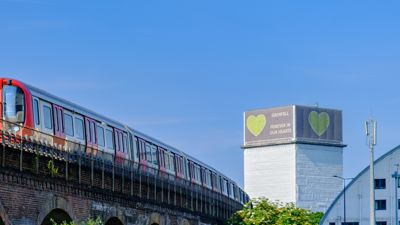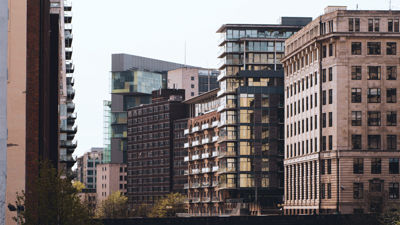Latest building safety amendments have been welcomed by TPI
- Following recent debates in Committee Stage, the Government has announced several new amendments to its building safety crisis strategy and the Building Safety Bill
- Further protections for leaseholders against remediation costs, and tough sanctions announced for developers and product manufacturers
- Resident Directors given powers to appoint professional directors
Since laying out its approach to tackling the country’s building safety crisis in January, the Government has introduced a number of new amendments to further strengthen the robust package of measures already introduced.
Having extensively engaged with Government and other stakeholders for several years, including the recent Building Safety Bill debates in Parliament at Committee stages, ARMA and IRPM – now merged as The Property Institute (TPI) - have welcomed the new approach, particularly the additional protections for leaseholders from the egregious costs, the removal of the duty to appoint a building safety manager, and the additional powers passed to resident directors to appoint third-party professional directors.
The latest announcements have been introduced to help make the remediation programme and new building safety regime fairer and more workable and are guided by the three key principles which underpin the Government’s approach to tackling the building safety crisis, which are:
- We must protect leaseholders
- We must make industry pay to fix the problems for which it is responsible
- We must restore common sense to the assessment of building safety risks, speeding up fixing the highest risk buildings and stopping buildings being declared unsafe unnecessarily.
Protecting Leaseholders
The latest amendments will exempt more leaseholders from any associated costs of remediation. In addition to exempting all leaseholders in buildings over 11 metres from cladding costs, qualifying leaseholders with properties valued at less than £175,000 (or £325,000 in Greater London) will now be protected entirely from other costs relating to historic fire safety defects. There will also be protection for leaseholders who own a small number of properties, providing that those owning up to three properties qualify for all leaseholder protections in the Bill (up from two properties previously)
The latest changes also make it easier for leaseholders to pay their capped contribution towards non-cladding remediation, where the building’s developer, freeholder or landlord cannot be traced or cannot afford to pay the full costs, allowing leaseholders to spread their contribution payment over ten, rather than five years.
In addition, Remediation Orders will be introduced to ensure that any required remediation work is conducted and completed quickly, preventing leaseholders being trapped for years in unfinished, unsafe buildings. The new Remediation Orders will set out the work required, and the time period in which it must be completed by the landlord of a building.
Taken together, these changes mean that many leaseholders across England will now pay nothing for any remediation work; and of those remaining, no-one will be liable to pay more than £10,000 (£15,000 in London) for remediation works across their lifetime. This is certainly a welcome improvement, but it is the firm belief of ARMA and IRPM that no leaseholder should be liable for any costs and would like to see the Government’s approach go even further to protect all leaseholders from cladding and non-cladding historic fire safety defects.
Making Industry Pay
The ‘Polluter Pays’ principle, something welcomed and championed by ARMA and IRPM since last year, has been adopted by Government in its approach, making it clear that those who developed defective buildings or produced and sold dangerous cladding and insulation products and materials must pay to fix the problems they created.
The Secretary of State, Rt. Hon. Michael Gove is expected to make further announcements on the progress of his discussions with industry to ensure they self-remediate their buildings. In the meantime, the Government has announced new measures aimed at developers and product manufacturers, if they do not agree voluntarily to pay for required remediation work.
These include powers to block developers from starting work on new developments, even where they have approved planning permission, and to stop new buildings being signed off as fit for use. Whilst the Government stresses that they do want to have to resort to exercising these powers, the industry should be in no doubt that the Government will not hesitate to use them, should it become necessary.
In addition, the Government is strengthening the tools available to compel developers and construction products manufacturers to pay their share of remediation costs. New Remediation Contribution Orders will be available to encourage developers, partnerships and limited liability partnerships, and landlords to pay for remediation, preventing them from hiding their liability behind complex company structures.
Crucially, these Orders will also require developers of defective buildings to reimburse their leaseholders for any costs they have already paid for remediation. Alongside this, new causes of action will be introduced to compel construction product and material manufacturers to pay to put right buildings where safety has been compromised by their products, further reducing the costs for which leaseholders might become liable.
This is a strong stance, and as a supporter of the ‘Polluter Pays’ approach, in principle, these measures are welcomed by ARMA and IRPM. However, the lack of detail at this stage is concerning. Clarity on how these sanctions and powers will work in practice would be welcome – there is a significant risk of numerous cases of litigation to determine who is responsible, which could cause delays and high legal costs for leaseholders, running contrary to the Government’s approach principles.
ARMA and IRPM would like to see the Government engage relevant stakeholders and convene a Fire Safety Delivery Group, to minimise the risk of extensive litigation and ensure high-risk buildings are prioritised. As things stand, there is a shortage of contractors, scaffolding and other resources needed for remediation and prioritisation is therefore essential.
For ‘orphan buildings’, where the developer is no longer in business or there is ambiguity about who is responsible, we strongly favour the ‘front-funding’ option and are calling on Government to fund first to fix the problems (with cost control measures in place to protect the taxpayer), and then seek to recover the costs from the responsible parties second, thereby leading the effort to recover the costs from those who should pay. Without this, some unsafe buildings will remain unactioned for years to come. An urgent assessment of the true cost of up-front funding this way is needed - much of the outlay would come back to Treasury in VAT, corporation tax, income tax, stamp duty and the economic stimulus of contracted work and thousands of homes returning to the market.
The Future Building Safety Regime
Since the first draft of the Building Safety Bill, concerns have been raised about the structure of the future safety regime, particularly where additional costs and responsibilities were being placed on leaseholders and resident directors. Further to amendments proposed at the last Select Committee stage (including those suggested by ARMA and IRPM), four notable amends have been made to the latest draft of the Bill, including:
- Removing the duty to appoint a Building Safety Manager, ensuring there is flexibility in the regime to enable ‘Accountable Persons’ to set the most appropriate arrangements for their buildings and residents, and removing the unnecessary cost this role could impose on leaseholders in high-rise buildings
- Removing the separate Building Safety Charge, recognising the need to protect leaseholders from the cost of creating an additional charging infrastructure
- Requiring the Building Safety Regulator to invite disabled representatives onto its residents’ panel; ensuring they have a strong voice in the regime as those among the most vulnerable in the event of a building fire
- Enabling resident-managed buildings to appoint an external professional director to support them in meeting their building safety duties
ARMA and IRPM broadly support these amendments as a first step to making the new building safety regime sensible, deliverable, and affordable. As with the previous announcements, the detail is fairly light and there are some areas where these amendments could go much further to provide a more robust solution.
ARMA and IRPM first raised concerns about having a separate Building Safety Manager in 2019 and have been calling for the role to be scrapped since the publication of the draft Bill. We therefore welcome the Government’s decision to remove the duty to appoint a Building Safety Manager, which would have caused unnecessary costs for leaseholders. Property management professionals already work hard to look after the safety of their buildings and where expert advice is needed to fulfil the new responsibilities in the Bill, this should be brought in from an external third-party in the same way that property managers draw on other types of expert advice in the running of a building.
In removing the role of the BSM, which was originally designed to be undertaken by individuals with specialist qualifications, it is important that the functions assigned to them are proportionate, so they can be carried out effectively by property managers in a similar manner to the work they already do now. If the functions of a BSM are markedly different to current safety management functions, then there will be a need for further investment in time and skills that will result in costs to leaseholders. ARMA and IRPM call on Government to continue working closely with our industry to ensure property managers can fulfil the new duties and keep any additional costs to a minimum.
The same principle of proportionality applies to other aspects, such as the information required to safely manage a building. For too long, property managers often have had difficulty sourcing even basic information about the buildings they manage, and warmly welcome the principle of the Golden Thread. However, while the Golden Thread should be readily available in new buildings going forward, we are concerned that the cost of retrospectively assembling the ‘golden thread’ for older buildings could be expensive for leaseholders.
ARMA and IRPM have been making the case to Government since the first draft of the Bill that the separate Building Safety Charge should be scrapped, and we welcome the Government’s decision to do this. A separate charge would have added unnecessary charges to leaseholders due to the extra financial administration involved and collecting sums through the service charge will work better in practice.
Enabling resident-managed buildings to appoint their own professional director to support them in meeting their specific building safety duties is important, as there could be situations where no residents are prepared to take on the director role. In some instances, this could mean the freehold of flats revert to the Crown and become unsellable and expensive to buy back the freehold. However, appointing a professional director should be seen as a last resort as it will lead to additional costs to leaseholders. Instead, we urge the Government to ensure that residents are able and willing to take on the direct role in resident-managed buildings, for example by ensuring there is high quality training to equip residents with the knowledge, understanding and confidence to fulfil this role.
Andrew Bulmer, CEO of The Property Institute, commented:
“It is clear that policymakers have been listening carefully to the evidence put forward by leaseholders and property managers affected by the building safety crisis. We welcome these latest amends to improve the remediation process and are pleased that some of our key concerns have been directly addressed.
“Despite the progress being made, there is still a mountain to climb, and we are several years away from resolving the cladding crisis. Property managers see its impact on the ground every day, and the strain on leaseholders, resident directors and property managers is extremely concerning.
“Nearly five years after Grenfell, there are still many unsafe buildings that have not been put right. Residents should not have to wait any longer while people haggle over who pays and the Government must introduce a Fire Safety Delivery Group urgently so the most serious cases can be actioned.”


